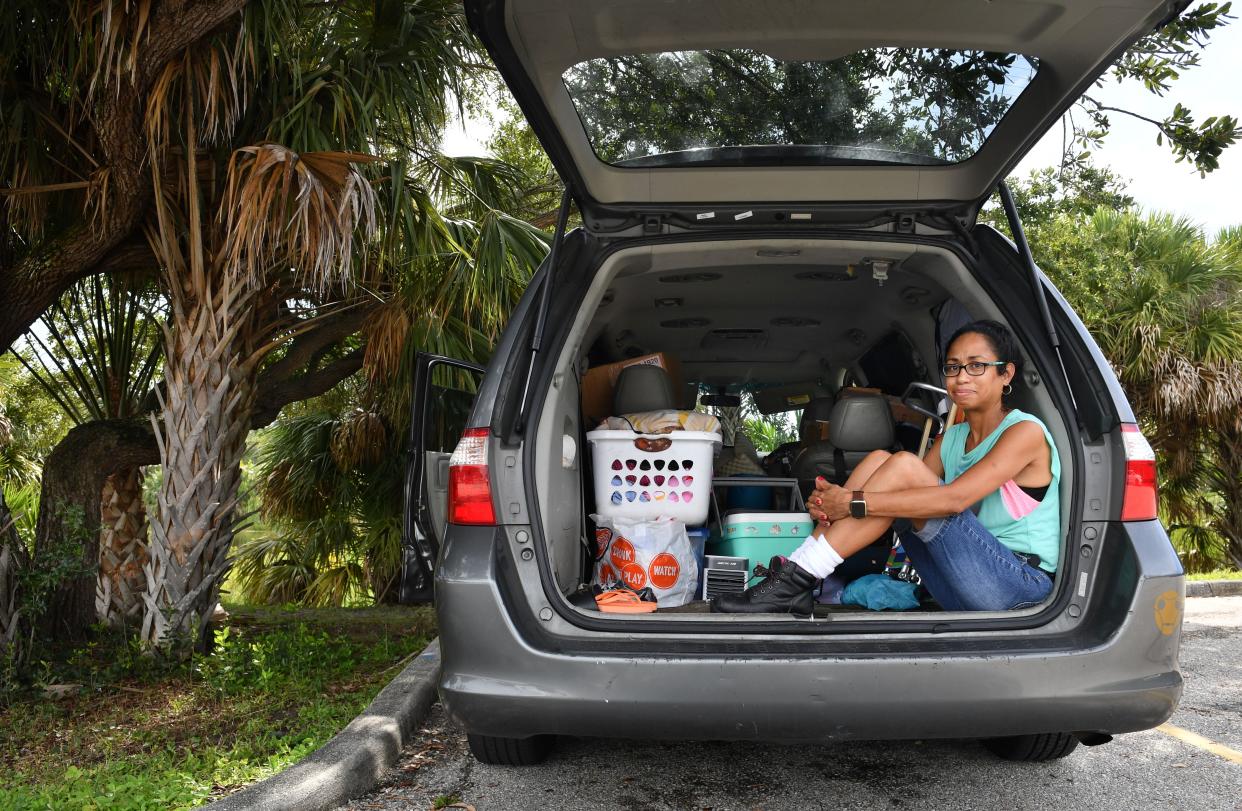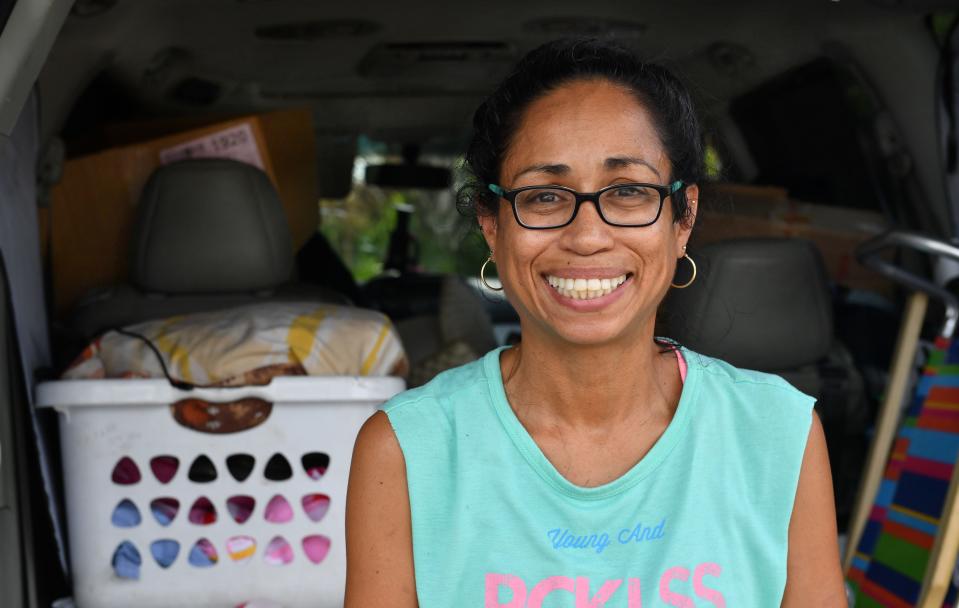Women veterans can fall between the cracks in the Sarasota-Manatee housing crisis

Margarita Ping waited all week for word on her rental application for an apartment she knew she could barely afford.
For the past several months, the 47-year-old North Port mother of two young girls has been living in her van, in motel rooms or at the home of friends.
An Army National Guard veteran with a good job, Ping made call after call to apartment complexes and social service agencies after leaving a volatile marriage in June.
Housing Crisis: Second Heart Homes expands housing program for adults experiencing homelessness to Manatee County
Affordable Housing: Great demand for Sarasota workforce housing at Lofts on Lemon as applications open
Yet, despite many programs for veterans, Ping qualified for none, even as she got turned down or put on waiting lists for one apartment after another amid a major crisis in affordable housing.
“Everywhere I looked, I make too much money or not enough money,” said Ping, a downstream technician for King Plastic Corp.
Ping is not the typical face of homeless veterans – most of whom are men and who suffer from a disability, mental health illness or substance abuse, numerous studies show.
Yet she is among countless women who formerly served in the armed forces who are falling between the cracks of programs offered through the Veterans Administration and other social service agencies, programs that tend to target single men or the very poor, advocates say.
It is a gap in support and services particularly felt by working, struggling women veterans with children.
'It seems like we're getting the leftovers, if anything'
The problem was enough to spur one Sarasota woman into action on their behalf.
“I’m a fighter,” said Deborah Graves, 63, of Sarasota, a U.S. Air Force veteran and former corporate information technology specialist. “I was led to do something about it.”
Prompted by her own experience with housing instability as well as those of women veterans like Ping, Graves in 2016 formed a nonprofit called Leave No Female Veteran Behind.
The nonprofit offers financial guidance toward home ownership but eventually hopes to raise enough funds to buy land where the nonprofit could build homes to sell or rent to women veterans.
Transportation: Nonprofits test transportation solutions for families on the edge
When everything rides on the car: How one family navigates a trifecta of crises
As rents skyrocketed during the pandemic, Graves herself had to turn to housing vouchers provided through a HUD and VA partnership – a process she described as cumbersome and delayed, forcing her to forgo reasonable rental opportunities by the time the voucher came through and then be put up in run-down hotels.
On the other end of the market squeeze, she said, when women veterans do qualify for a VA home loan – as Graves once did – sellers in a hot real estate market often turn them down, flush as they are with cash or conventional offers.
"The military motto is 'Leave no man behind,' and that is supposed to carry over to civilian life as well, and it doesn't," Grave said. That appears especially true for women veterans, she added.
"It seems like we're getting the leftovers, if anything."
“I try to keep the girls out of this so I don’t traumatize them.”
As Ping took steps to leave her husband, she got the job at King Plastic, opened her own checking account, and packed up her belongings and those of their daughters, ages 10 and 8.
All summer she desperately searched for an apartment for herself and the girls – an almost impossible task with no savings and a thin credit history of her own after years as a stay-at-home mom, caring for their special-needs child.
Ping pulled overtime shifts to augment her income. She placed the girls with a relative when it was her turn to have them, while she stayed at budget motels – encountering other struggling moms with kids.

Many times she slept in her 2007 Honda Odyssey van, taking turns between Wal-Mart parking lots and other shopping centers, places that looked safe, meeting other families doing the same. She’d sleep for a bit, then drive away before attracting attention to herself.
“It is a delicate ballet dance I’ve been doing,” Ping said. “I try to keep the girls out of this so I don’t traumatize them.”
Week after week, the nonprofits she called referred her to other resources or placed her on waiting lists for transitional family housing for her and the girls – her income making her ineligible not only for state-administered food assistance but also for additional VA housing help.
The second week of August, staying temporarily with friends, she thought she found something she could swing on a tight budget: a two-bedroom apartment in Port Charlotte, for $2,183 a month.
Maybe, she thought, she could get the girls a stable home in time for school, start scraping together money for speech therapy that her youngest so badly needed, or gymnastics and music classes her oldest kept asking for.
“If the apartment doesn’t come through,” she said, “I’m back in that van.”
'The silent homeless'
Women, in general, are more likely to be doubled up in someone else’s home or staying in unhealthy relationships to avoid actual homelessness, said Chris Johnson, CEO of the Suncoast Partnership to End Homelessness.
“So many times that is the silent homeless,” he added, “and so you don’t hear from them, even though they are at a great risk at any moment or currently in an abusive situation.”
And while they are a smaller portion of the overall veteran population and homeless veteran population – about 10% and 9% respectively – women veterans face special factors that leave them particularly vulnerable to homelessness.
Numerous studies show that despite lower chances of living in poverty compared to non-veteran women, women veterans are three times as likely as poor non-veteran women to wind up homeless. Women veterans also report experiences of isolation, barriers to care, a lack of coordinated services and a scarcity of long-term housing options.
Many community-run programs intended to help women veterans frequently do not have the capacity to handle clients with children, greatly limiting women veterans’ participation, say advocates.
Great gains
A spokesperson for the Veterans Administration could not be reached for comment.
But studies show that the VA has taken major steps to help veterans with housing in the last 10 years – during which veteran homelessness has been cut in half.
One of the biggest efforts rolled out the past decade has been the Supportive Services for Veteran Families program, or SSVF, which provides about $400 million in grants a year to non-profit agencies across the country to help low-income veteran families with emergency or transitional housing, case management and a path to housing stability.
In 2021, almost 200,000 women veterans were served by SSVF, VA reports show.
But SSVF has limitations – namely, it is intended only for veterans with very low incomes.
In the Sarasota area, the cap is set at 50% of Area Medium Income (AMI) or less, which translates into an annual income of $30,250 a year for one person or $38,850 a year for a family of three, if Ping were to be counted with her daughters.
Bold moves or more of the same? Sarasota-area governments mobilize on affordable housing
Senior Housing: Where do we go? Sarasota seniors worry when even 'affordable' housing costs spike
Working with local nonprofits that administer SSVF – including St. Vincent De Paul CARES and Jewish Family & Children’s Service of the Suncoast – has been a godsend for overwhelmed veterans groups in the housing crisis, said Gene Jones, president of Florida Veterans for Common Sense in Sarasota.
Still, he agreed with Graves that help from VA-related programs can be time-consuming, cumbersome and are often geared to single men, leaving women falling through the cracks.
“It’s probably one of the most frustrating situations,” Jones said.
For long-time affordable housing advocates like Jon Thaxton, Gulf Coast Community Foundation’s senior vice president for community leadership, the matter raises moral questions for a community, state and nation when it comes to leaving veterans like Ping on the street.
“What’s really a shame,” said Thaxton, who has sounded the alarm on affordable housing for decades “is that a woman with a special needs child who served her country voluntarily is now in a position where we do not have an assistance program especially to meet her needs.”
Back to the van?
The decision on Ping’s rental application finally arrived last week.
The answer was no. Her credit wasn’t good enough.
Ping could not stop crying. She didn’t want to talk to anyone. All her dreams for her girls and the life she wanted to give them crumbled before her eyes.
The only option she could imagine ahead for the three of them was to leave the Sarasota area, where she had planted deep roots.
But then a friend pointed her to an apartment complex in North Port.
Despite her low credit score, they were willing to work with her.
Eighteen hundred a month would still be a struggle. But with her overtime, she’d make it work.
“We can do this, we can grow and become the real family I want to be,” Ping said about the road ahead that she envisioned for their lives. “It’s me and my daughters, that’s how I see it. Me and my girls.”
This story comes from a partnership between the Sarasota Herald-Tribune and the Community Foundation of Sarasota County. Saundra Amrhein covers the Season of Sharing campaign, along with issues surrounding housing, utilities, child care and transportation in the area. She can be reached at samrhein@gannett.com.
This article originally appeared on Sarasota Herald-Tribune: Affordable housing: Sarasota-Manatee women veterans see less support

